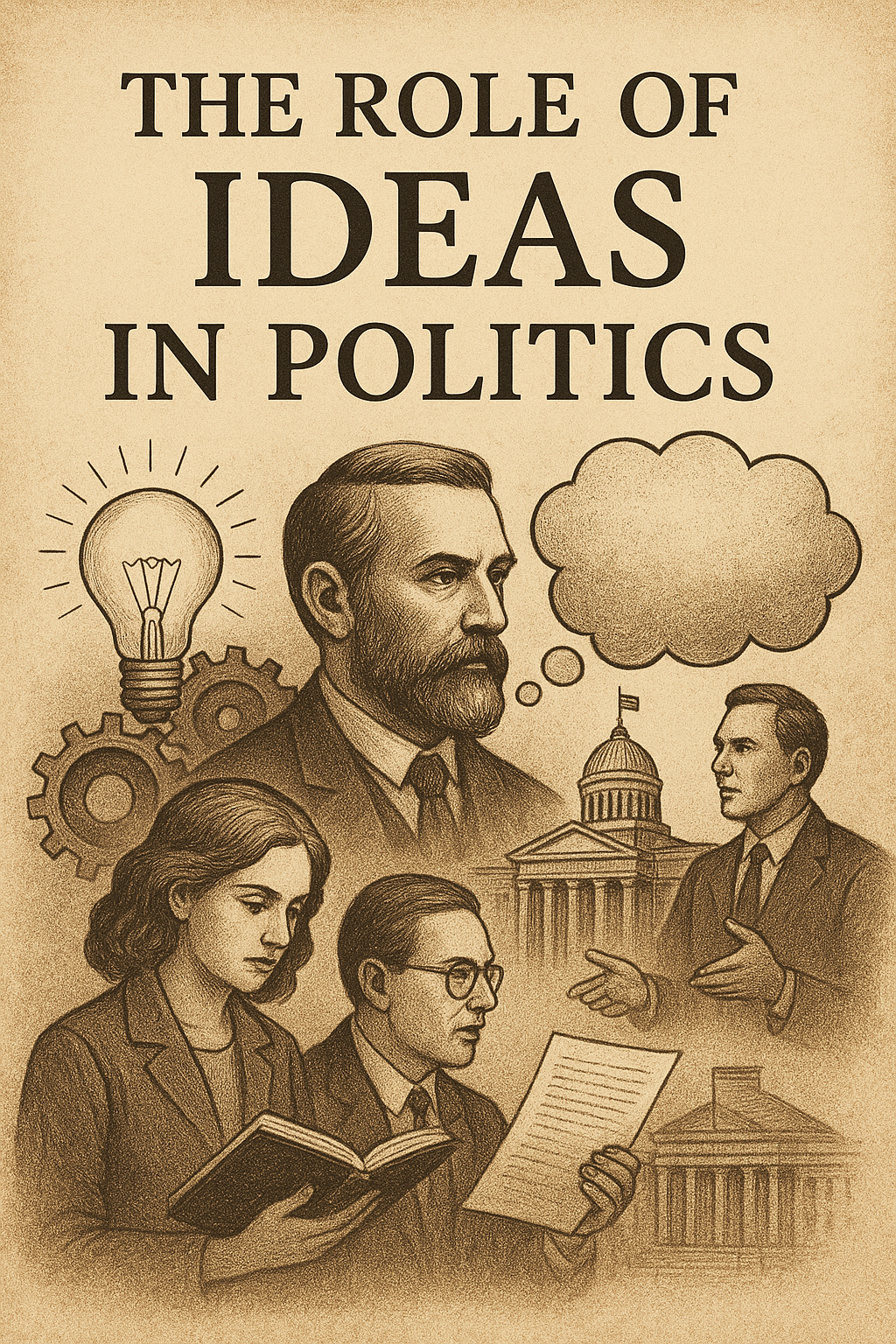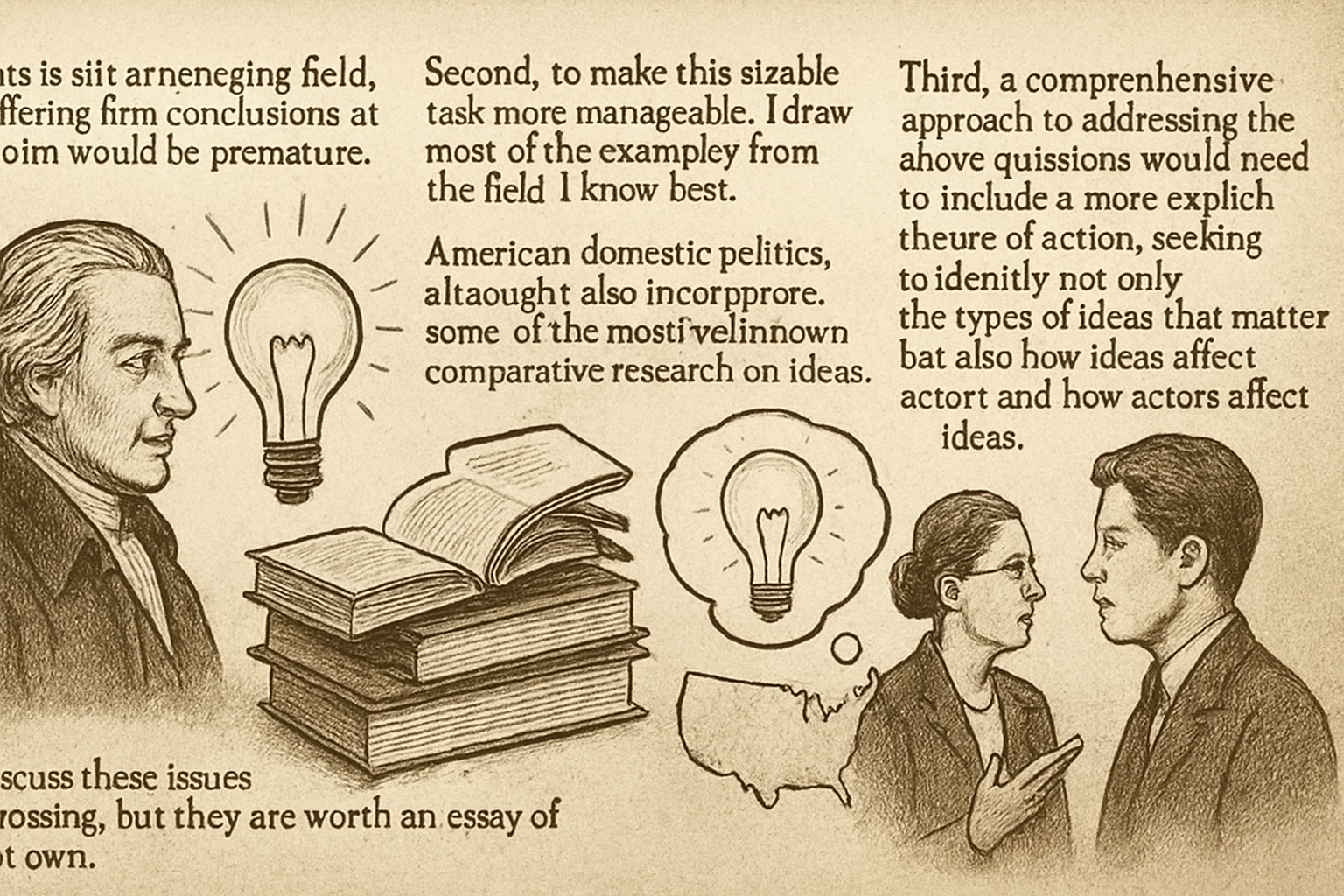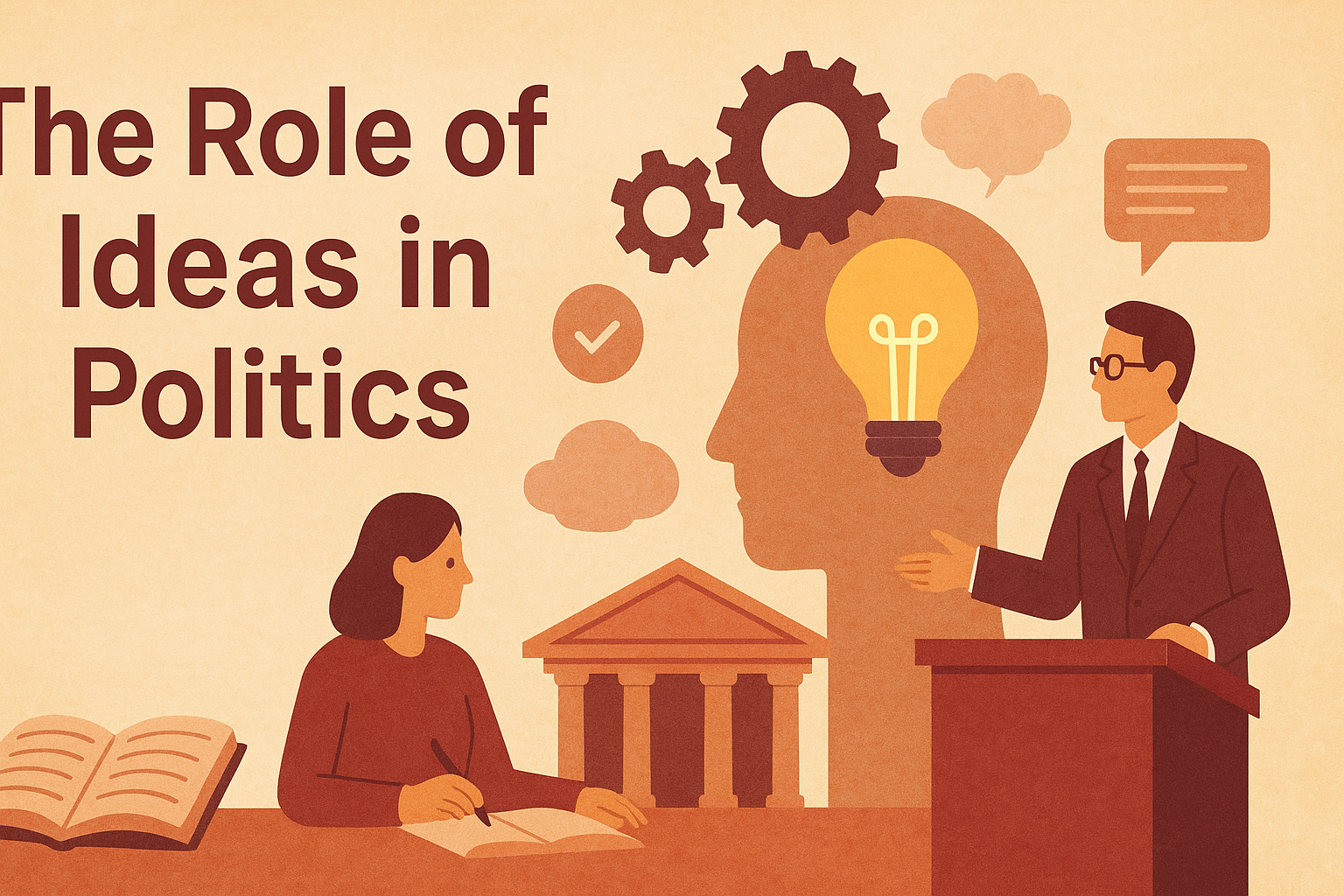The significance of ideas in politics has long been underestimated by political scientists focused on material interests and rational choices. Yet, ideas—ranging from beliefs and ideologies to policy frameworks—profoundly shape how societies think, act, and govern. This essay explores the evolution of political thought on the role of ideas, tracing its roots from Weber’s cultural analyses to modern ideational approaches. It challenges the notion that politics is driven purely by structure or self-interest, showing how ideas influence everything from policy formation and voter behavior to institutional change. Moving beyond the debate of whether ideas matter, it examines how they matter—how certain ideas triumph, define public philosophy, and direct policy outcomes. Ultimately, understanding ideas offers deeper insight into why political systems and welfare states take their specific forms, revealing that power in politics is as much about persuasion and vision as it is about resources and interests.

The role of ideas in politics
The role that ideas play in politics has long been appreciated more by the newspaper reader than by the average political scientist or sociologist. Dismissed by Marxists and other materialists as a mere smokescreen that powerful actors use to mask their interests and seen by rational choice theorists as, at best, focal points for rationally self-interested actors (Bates, de Figueiredo, and Weingast 1998), ideas have begun to be taken more seriously in political analysis during the past twenty years (Stone 1988; P. Hall 1989; P. Hall 1993; Skrentny 1996, Skrentny 2002; Dobbin 1994; Rueschemeyer and Skocpol 1996; Berman 1998; Lieberman 2002; Steensland 2006; see Campbell 2002 and Berman 2001 for reviews). While Heclo introduced the idea that policy makers “puzzle” as well as “power” in 1974, it has been only recently that scholars have begun to examine in detail the various ways in which ideational factors can interact with interest group, electoral, or state-centered accounts (Weir 1992; Skrentny 1996; Zollars and Skocpol 1994).
Of course, cultural analyses of politics have not always been in such disfavor—one only needs to think of Weber’s famous “switchman of history” metaphor. But for much of the postwar period, cultural explanations have been very much on the wane, for reasons that are worth an essay of their own. One reason for the anti-idealist turn was a reaction against Parsons’s unified theory of culture, provoking a conflict school of political sociology that emphasized inequalities in power and the power of interests. Another was the growth of techniques for quantitative modeling and the associated emphasis on methodological individualism. The emergence of rational choice theory and the virulent antiempiricism of postmodern approaches to studying culture further weakened the position of those who would conduct empirical analyses of politics employing ideational variables (see J. Hall 1993 for one attempt to make sense of these changes).
If Ideas Did Not Matter.
For these reasons, scholars of politics who work with ideas have, until recently taken a largely defensive posture, seeking to establish that “ideas matter” in an, academic terrain that privileges neo-Marxist, structuralist, or rational Choice modes of explanation. But while the idea of “ideas” may seem foreign to scholars working in other traditions, the notion that ideas matter is one that almost all of us routinely accept as we both participate in and think about everyday social and political life.
Consider what it would mean to assert that ideas did not matter. (To be precise, I define an idea to “matter” when it
- Shapes people’s actions and
- Is not reducible to some other non-ideational force.
At the broadest level, asserting that ideas do not matter would mean that shifting ideals about science, religion, democracy, slavery, colonization, gender, race, and homosexuality, to pick just a few salient examples, either have not appreciably affected how people act or were themselves the product of technological, economic, or other material forces.
Shifts of ideas widely considered foundational to Western civilization, such as the spreading of Enlightenment thought, would similarly have to be either irrelevant or reducible to other forces. Entire disciplines, such as intellectual history, would be obsolete. School boards and college commit. tees would stop fighting about the curriculum, and movements to ban books would dry up. The tens of millions of dollars that are spent on think tanks to churn out ideas and public relations firms to market them would be largely wasted.
The billions of dollars spent on market research and on advertising would be unnecessary. Consultants of all types, as purveyors of ideas about how to improve practice in different fields, also would be largely out of business. In politics, people would vote exclusively out of material self-interest. There would no longer be anything the matter with Kansas, and limousine liberals in Cambridge and Berkeley would become antitax crusaders.
Job seekers would not choose careers because of their meaning; college students would stop trying to find themselves. Terrorists would not blow up buildings out of visions of religious glory or ideological triumph. ‘(here would be no such thing as 4 thought leader or a visionary.
One could imagine a critic’s reply, but such a reply would likely have to concede some role for ideas. A critic might acknowledge that, yes, ideas matter, but in many cases they matter only instrumentally as means to ends that have been predetermined by other structural or self-interested reasons. A critic might acknowledge that ideas matter in the most fundamental way—as all of out social institutions are, in a sense, the embodiment of ideas—but claim that ideas offer little analytic purchase in explaining why a person, group, or polity did X instead of Y. A critic might acknowledge that the Enlightenment brought about considerable shifts in our views on science and religion but argue that The Varied Roles of ideas in Politics 28 the shifts were themselves products of broader economic or technological forces. These are all debates that are worth having, but I would submit that given the ubiquity of ideas in all facets of everyday life, the burden of proof lies with the critics to show that ideas do not matter, rather than with proponents to show that they do.
Ideas and Politics: From “whether” to “how”
Given these realities, the key questions for scholars interested in ideas are less whether ideas matter and more how they matter.? And here is where social scientists have much to contribute, even working in areas that have been extensively plumbed by other disciplines such as intellectual history that have long incorporated ideas into their analyses.
By specifying what kinds of ideas serve what functions, how ideas of different types interact with one another, how ideas change over time, and how ideas shape and are shaped by actors’ choices, social scientists can provide greater analytic purchase on the question of exactly how ideas matter. In recent years, scholars in the field have begun this move from “whether” to “how,” and I build upon many of these insights below.
Of course, specifying how ideas matter is still a considerable task, even if we restrict ourselves to politics, as this book does. Ideas, broadly defined, are central to questions about agenda setting, social movements, revolutions, diffusion, policy choice, the conceptual categories that underlie politics, path dependency and path-shaping change, institution building, institutional stability, institutional change, voter identity formation, interestgroup formation, and political coalition building. While much previous work in the domain of “ideas and politics” has been conducted by scholars of the welfare state, over the longer term, a thorough discussion of the topic would include more voices from other subfields of political science and sociology and would also incorporate work from cognitive psychology, linguistics, and even neuroscience.
My task here is more limited though still daunting in its potential scope. I am interested in policy ideas per se, by which I mean ideas of varying levels of generality that define how policymakers should act. Building upon and drawing together the best work in the field, I seek to offer a synthetic analysis of how ideas matter in politics: what is known, what is not known, and what areas are in need of further research.
Drawing on Kingdon (1984) and others, I consider ideas at three levels of generality: policy solutions, problem definitions, and public philosophies or zeitgeist. While problems and solutions are familiar terms in some parts of the literature, the broader notion of public philosophies or zeitgeist has been less frequently discussed. I also consider interactions between the levels of ideas, with a particular interest in “upward-flowing” interactions, showing, that not only does the conception of a problem constrain policy alternatives, but the fate of specific policy solutions also can have an impact on problem definitions, or even broader public philosophies.
Within each of these categories, I seek to explore why some ideas trivia), over others. While the literature is ripe with case studies that show this a particular idea was important in explaining specific outcomes, there has been much less work that has tried to discern systematically what differentiates Victorious ideas from their rivals.
Through answering these first two questions what kinds of ideas Tate, and why some ideas win out over others—I also seek to address a critically important question that has received insufficient attention in the broader welfare state literature: considering the potential universe of policy options, why does policy take the specific form and content that it does?
While this would seem as if it should be a central question of political science ang political sociology, it has often been ignored by broader theories that are more concerned with the constraints that bound choice than with the content of the choices themselves.
As Beland and Hacker write of one such theory, historical institutionalism: “the institutional perspective is considerably more instructive as an explanation of the prospects for policy reform than as an explanation of the specific form that policy change takes. If the question is merely why the American welfare state is ‘smaller’ or ‘less developed’ than European welfare states then it may be enough to cite America’s distinctive framework of political institutions.
But if the question is why the American welfare state has taken the structure that it has, then systematically unpacking the forces that shape actual policy choices seems unavoidable” (2004, 45). While historical institutionalism and other leading theories (such as interest groups or rational choice) offer accounts of the forces that govern policy making, a theory of ideas is needed to explain the content of policy choices.
Three caveats are in order.

First, this is still an emerging field, and offering firm conclusions at this point would be premature. As a result, my discussion contains as many questions as answers, and I devote space to identifying areas and questions that the next generation of research could seek to address.
Second, to make this sizable task more manageable, I draw most of the examples from the field I know best, American domestic politics, although I also incorporate some of the most well-known comparative research on ideas.
Third, a comprehensive approach to addressing the above questions would need to include a more explicit theory of action, seeking to identify not only the types of ideas that matter but also how ideas affect actors and how actors affect ideas.
I discuss these issues in passing, but they are worth an essay of their own.
Frequently Asked Questions
Q1: What’s the difference between an idea and an ideology in politics?
An idea is a specific belief or model (e.g., “taxes should be lower”). An ideology is a broader system of inter-linked ideas (e.g., liberalism, conservatism). Knowing the difference helps you see how ideas aggregate into frameworks.
Q2: Can a single idea change politics?
Yes. When an idea gains enough acceptance and translates into policy, political landscapes can shift. The concept of the Overton Window shows how what was once unthinkable becomes normal with enough idea-change.
Q3: How do I know if an idea is influencing politics?
Look for shifts in public debate, new policy proposals, new institutions, think-tank publications. If you see repeated references to a belief or model, the role of that idea in politics is growing.
Q4: Does money matter more than ideas in politics?
Money and ideas both matter. Money funds campaigns, communication, lobbying. But ideas shape the beliefs that money acts upon. One study found that ideas often mediate interests.
Q5: How can ordinary citizens influence the role of ideas in politics?
By engaging in discussion, writing, volunteering for causes, supporting research, educating ourselves and others. Ideas spread when people share, debate and apply them.

